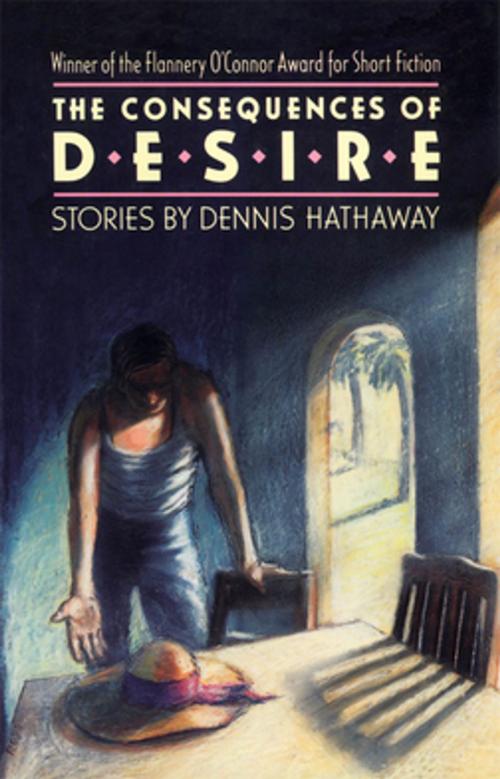| Author: | Dennis Hathaway | ISBN: | 9780820342948 |
| Publisher: | University of Georgia Press | Publication: | August 15, 2011 |
| Imprint: | University of Georgia Press | Language: | English |
| Author: | Dennis Hathaway |
| ISBN: | 9780820342948 |
| Publisher: | University of Georgia Press |
| Publication: | August 15, 2011 |
| Imprint: | University of Georgia Press |
| Language: | English |
The stories collected in The Consequences of Desire describe a modern urban society in its extraordinary complexity, its often apparent absence of fixed values, and its resistance to easy understanding.
In "Counting Mercedes-Benzes," Marshall is a directionless young man who believes he can escape his parents' Beverly Hills lifestyle by marrying for love. He fails to realize, however, that the woman he thinks he loves, his mother's Hispanic maid Geneveva, has little in common with the person he imagines her to be.
The title story concerns a corporate lawyer who was a radical at Berkeley in the sixties. By chance he runs into his lover from that time and discovers how far the two have traveled in the intervening years. In "Lost in Rancho Mirage," Denton is a young man who might "have been picking up garbage or digging ditches if his grandfather hadn't left his (Denton's) father a piece of real estate that turned out to be directly in the path of a freeway." He must come to terms with the fact that he can never fully possess his beautiful girlfriend: "The imaginary sunlight bathing Jill, he realized, was a microcosm of a world in which she would always be the center; he would always be standing a little off, in a shadow, where he belonged."
The need to overcome reality often becomes an obsession for these characters. In "Space and Light," an architect's realization that a former protege has surpassed him both financially and artistically prompts him to attempt something wholly original for the first time, a project that leads him down an inexorable path to madness, to a darkness from which there is literally no escape. In "The Girl Detective," Justine's disappointment over her first sexual experience is juxtaposed to her resentment at being born a girl. To her, being a girl means "always wanting to be something different, someone else, unable to accept the facts that some of her friends seemed to consider, amazingly, a stroke of the utmost fortune." In the aftermath of her surrender to passion on the grass of the municipal golf course, she indulges her childish fantasy of being a private eye—"not Nancy Drew but Philip Marlowe, Sam Spade, Lew Archer, even the virulent, violent Mike Hammer."
Set mainly in California, these stories portray a world where dreams come into conflict with reality, where perception fills the space between truth and fiction, logic and emotion, fantasy and disaster.
The stories collected in The Consequences of Desire describe a modern urban society in its extraordinary complexity, its often apparent absence of fixed values, and its resistance to easy understanding.
In "Counting Mercedes-Benzes," Marshall is a directionless young man who believes he can escape his parents' Beverly Hills lifestyle by marrying for love. He fails to realize, however, that the woman he thinks he loves, his mother's Hispanic maid Geneveva, has little in common with the person he imagines her to be.
The title story concerns a corporate lawyer who was a radical at Berkeley in the sixties. By chance he runs into his lover from that time and discovers how far the two have traveled in the intervening years. In "Lost in Rancho Mirage," Denton is a young man who might "have been picking up garbage or digging ditches if his grandfather hadn't left his (Denton's) father a piece of real estate that turned out to be directly in the path of a freeway." He must come to terms with the fact that he can never fully possess his beautiful girlfriend: "The imaginary sunlight bathing Jill, he realized, was a microcosm of a world in which she would always be the center; he would always be standing a little off, in a shadow, where he belonged."
The need to overcome reality often becomes an obsession for these characters. In "Space and Light," an architect's realization that a former protege has surpassed him both financially and artistically prompts him to attempt something wholly original for the first time, a project that leads him down an inexorable path to madness, to a darkness from which there is literally no escape. In "The Girl Detective," Justine's disappointment over her first sexual experience is juxtaposed to her resentment at being born a girl. To her, being a girl means "always wanting to be something different, someone else, unable to accept the facts that some of her friends seemed to consider, amazingly, a stroke of the utmost fortune." In the aftermath of her surrender to passion on the grass of the municipal golf course, she indulges her childish fantasy of being a private eye—"not Nancy Drew but Philip Marlowe, Sam Spade, Lew Archer, even the virulent, violent Mike Hammer."
Set mainly in California, these stories portray a world where dreams come into conflict with reality, where perception fills the space between truth and fiction, logic and emotion, fantasy and disaster.















